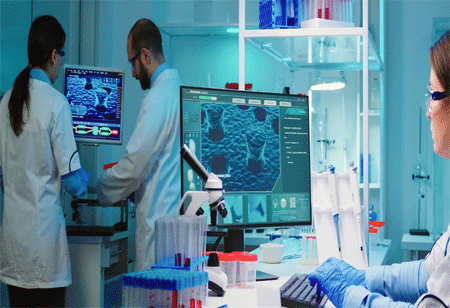India Pharma Outlook Team | Monday, 19 September 2022

Pharmaceutical R&D Progressing Toward Predictive Analysis Since the COVID-19 pandemic first impacted the life science industry around the world, Pharmaceutical R&D spending has reached over $200 billion each year — and it’s projected to surpass $250 billion by 2026. Rising expenditure patterns indicate a rise in the total capital investment globally in pharmaceutical research. A number of laboratories are now moving swiftly to make their spaces the future-ready green labs that their products require. The future of the pharmaceutical sector remains promising, despite persistent supply chain disruptions and the need for more efficient procurement of life science resources.
Today, the global pharma industry is increasingly investing in technology implementation. According to a GlobalData poll conducted in 2022, more than 70 percent of respondents in the pharmaceutical business opined that the application of smart technology would have the greatest influence on drug development. That being said in this article, let's look into the key updates in the pharma R&D.
Harnessing the Power of AI Nowadays, almost every facet of the pharmaceutical and healthcare industries uses artificial intelligence (AI) to improve data processing. In the coming days, adopting AI will highlight the astounding potential of the healthcare industry, with success rates soaring higher than ever before, particularly in the study and production of vital, life-altering pharmaceuticals. Researchers can successfully gather data thanks to AI, which functions as a machine learning system that continually responds to and analyses data. Additionally, AI will get wiser the more data it responds to, thus boosting the pharmaceutical sector. From designing and finding novel compounds to target-based medication validation and discoveries, AI can improve R&D. It can speed up the process of getting a trial started, but it can also get approval, meaning a drug can be placed on the market as quickly as possible.
Recently, NVIDIA, a US tech corporation, has unveiled Cambridge-1, the most potent supercomputer in the UK, to aid British healthcare researchers in addressing some of the most pressing healthcare concerns. The Cambridge-1 supercomputer has the ability to greatly speed up and improve all phases of drug development. To create a transformer-based generative AI model for chemical structures, NVIDIA is working with AstraZeneca. This model will let researchers utilize large datasets with self-supervised training techniques and speed up the drug development process. Quantum Computing in Drug Development In pharmaceutical drug development, quantum computing has the potential to significantly lower these expenses and, ultimately, medication costs.
Quantum computing in the pharmaceutical industry might lessen the need for expensive in vitro testing by enabling precise modeling of drug-target interactions and more quickly screening extremely vast virtual libraries.A medicine takes more than 10 years to develop from discovery to commercialization. As quantum computers can examine extremely complicated systems, including the human biological system and its responses to medications, they are useful for studying novel pharmaceuticals. Utilizing already-approved medications for novel purposes may become simpler thanks to technology.
Pharmaceutical companies are now able to compare hundreds of millions of complicated chemicals at once using quantum computing. This allows researchers to look for matches between molecules and forecast both the beneficial and harmful impacts of a new therapeutic strategy. Results and design time are both enhanced. It will be interesting to watch which therapeutic sectors in the pharmaceutical business will profit from quantum computing technologies first. The Australian-German company Quantum Brilliance is striving to make drug development using quantum technology a reality. The 2019-founded start-up is working to create diamond quantum accelerators that can model interactions between various compounds for in silico medication development.
As quantum computers can examine extremely complicated systems, including the human biological system and its responses to medications, they are useful for studying novel pharmaceuticals
Going Ahead For the development and continued success of research-based pharmaceutical enterprises, R&D has always been essential and likely will become much more so in the future. Pharma businesses steadily raised their financial investment in R&D-related activity in an effort to create a greater nominal R&D output in light of the industries' previous R&D strategy, which was based on internal innovation. In the coming days cutting edge technologies like AI, quantum computing will help to progress the industry to new heights.